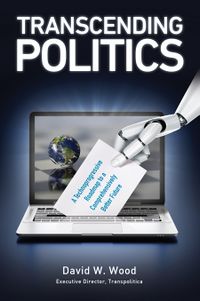Chapter 9. "Markets and fundamentalists"

Chapter 9. "Markets and fundamentalists" is the title of the ninth Chapter in the book Transcending Politics by David Wood.
'Transhumanists look at the human condition and proclaim: humanity deserves better. By taking advantage of the best insights and energies of present-day humanity, we can elevate humanity to a comprehensively better state. We can, and should, comprehensively improve our physical vitality, our mental acuity, our emotional wellbeing, and, yes, our economic relationships. In all these aspects, we can reach strikingly higher levels than at any time in human history (or prehistory). This proclamation alarms a series of different kinds of critics."
- - David Wood, Executive Director, Transpolitica[1]
Conflicting views on markets[править]
Market fundamentalists believe that free markets are absolutely the best way to decide the allocation of resources. For example, what price should a taxi company charge to transport passengers a given distance?
Collusion and cartels[править]
To proceed, let's consider one of the ways in which free markets can fail. In The Wealth of Nations, published in 1776, Adam Smith observed the dangers of collusion between tradespeoples[2].
The abuse of market power[править]
Cartels pose one challenge to free markets: several companies collude to keep prices high, quality low, and/or innovation constrained. Monopolies take this situation one stage further: a single company obtains such a dominant position in the market that, in effect, it is able to dictate terms to its customers.
When competition needs to be curtailed[править]
To recap: one significant issue with free markets is that they can evolve in ways that reduce competitiveness and therefore undermined their own rationale. With fewer companies actively competing against each other, the genuine needs of consumers can be left unmet.
Restrictions on economic freedom[править]
Laws limiting the employment of children are just one example of a restriction on economic freedom that is, nowadays, widely accepted. These laws intrude on the operation of the free market for employment. Even if…
Determining boundaries and externalities[править]
Where should the boundary fall, between the permitted and the impermissible? What is the method to tell whether a particular item of food or medicine is suitable to be freely bought and sold, as opposed to needing regulation? What safety regulations should …
The dangers of absolutism[править]
I started this chapter by discussing a number of different types of people, each of which I described as one-or-other sort of fundamentalist. I used the word “fundamentalist” with some care. It applies when someone allows one belief or insight to dominate all other aspects of their thinking.
When regulations cripple innovation[править]
One piece of analysis that does deserve more attention — despite it often being wrapped up in over-extreme rhetoric — is the evidence offered by free market advocates about glaring flaws in existing regulatory systems.
Overcoming vested interests[править]
Vested interests are powerful, but they're not all-powerful. Technoprogressives can point to many examples of disruptive forces overcoming the resistance put up against changed by incumbent industries. For example, the tobacco industry used to sponsor lots of research that appeared to be independent, and which through doubt over evidence linking smoking to cancer.
Beyond economic fundamentalism[править]
Whereas market fundamentalists believe that free markets are absolutely the best way to decide the allocation of resources, anti-market fundamentalists believe that such markets inevitably have deeply deplorable side-effects. Here are the kinds of things fundamentalists highlight.
External links[править]
- Buy the Book
- For convenience of readers, this page lists all the endnotes from Transcending Politics, in easily clickable form.